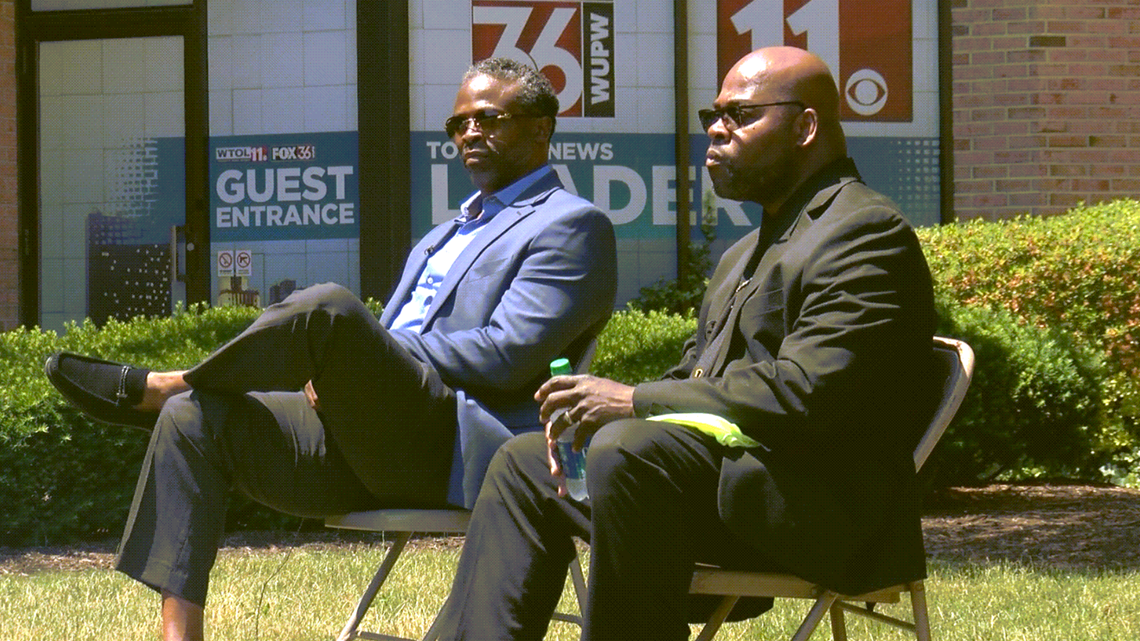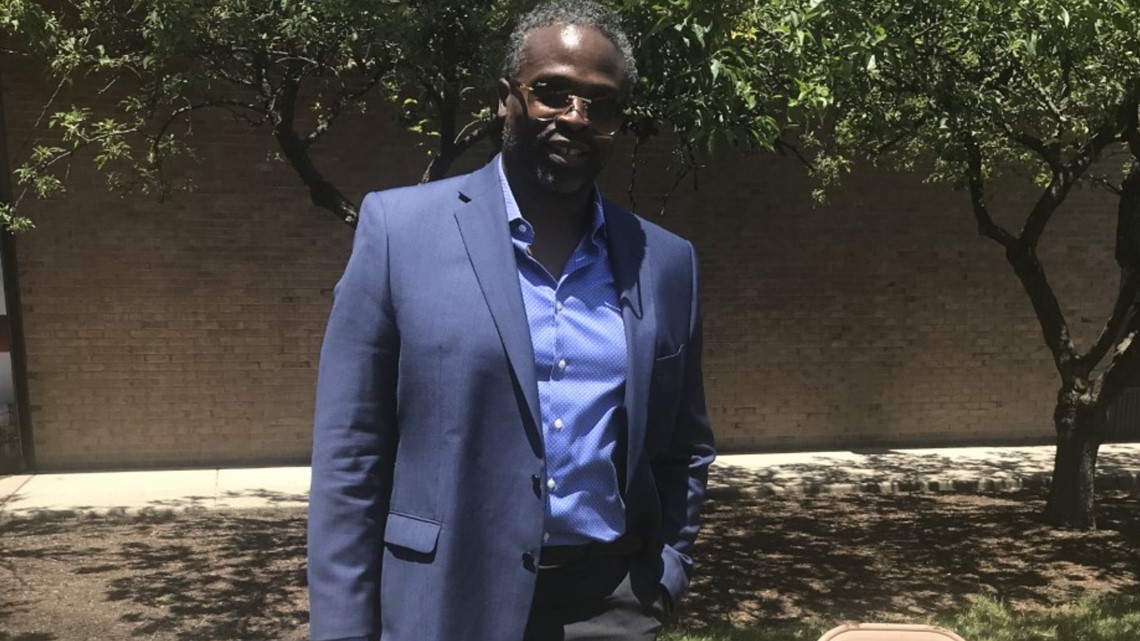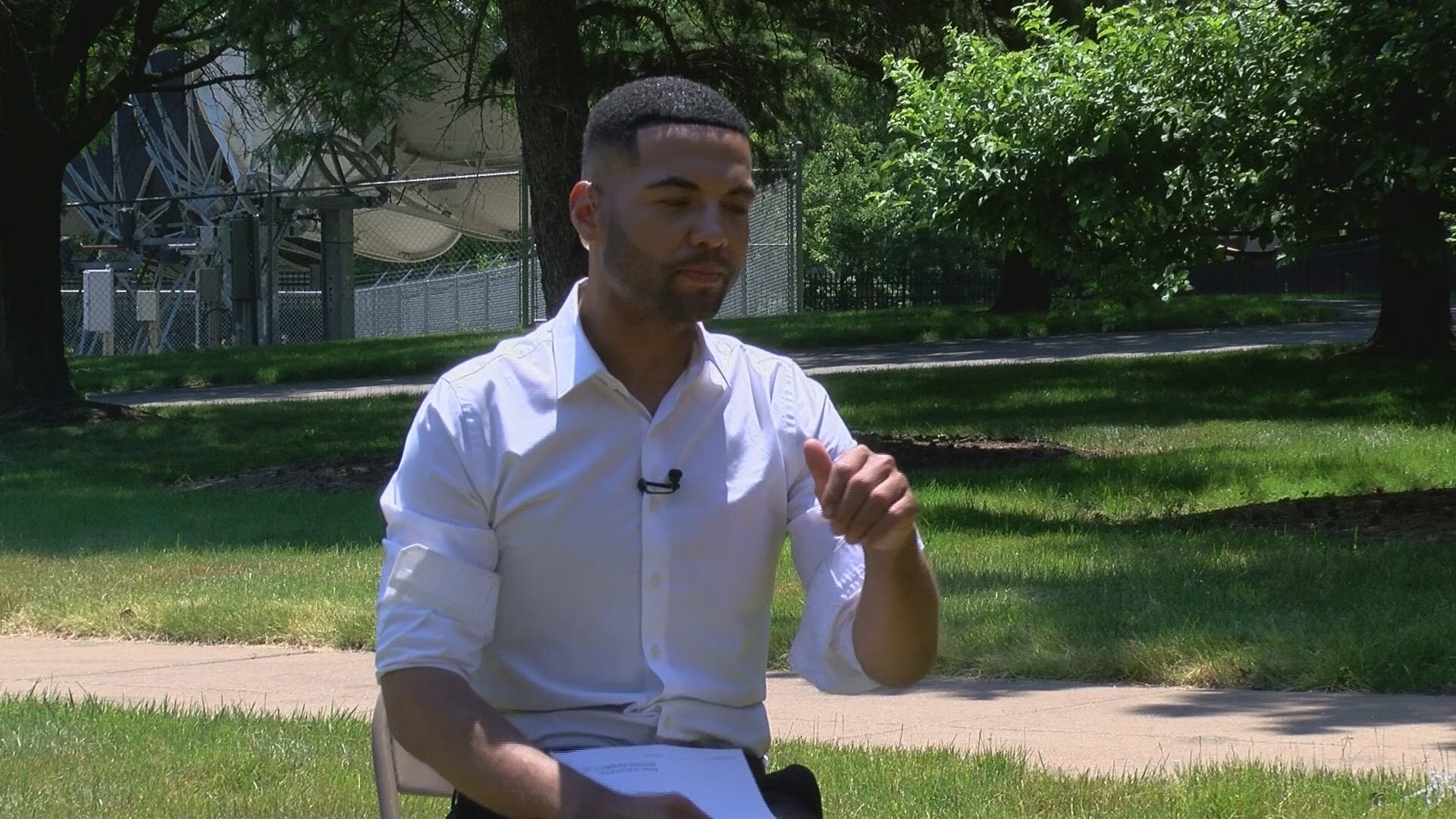TOLEDO, Ohio —
As the war against racism continues, dialogues on race relations are beginning to become more front and center across the country, world, and even right here in our own community.
The death of George Floyd, a black man who died at the hands of a white officer in Minneapolis, has sparked the outrage and protests from a collective diverse group of people around the world for several weeks now - but the frustration has been felt by Blacks for years.
The goal to simply be heard is slowly being answered through voices of change.
Wednesday
Nationally, black students are suspended and expelled at a rate three times greater than white students, often starting at an early age. Combine that with challenges at home, public perception, and a lack of resources and opportunities, they are stuck fighting an uphill battle, which fails to get any easier into adulthood.
The voice of change continues through two local educators - Dr. Carnel Smith, principal of Scott High School and Mr. Willie Ward, principal of MLK Academy for Boys - who see their students' struggles daily.
All our lives, Americans are told education is the key to success, and that having a high school or college diploma will open career doors, but for black and brown students, several ongoing societal issues stand in the way of that future, they say.


The conversation
Andrew: Dr. Smith, Mr. Ward, you both are educators locally. Mr Ward, leader at MLK Academy for Boys; Dr. Smith, principal at Scott High School. Take us inside those four walls. What are the challenges that our black kids face on a daily basis that spill into the classroom that make it hard to learn?
A: Smith: Well, I know everything it seems like it’s on the surface. You think about um, the things that’s going on at home in the community, but we gotta go further than that if we’re going to deeply talk about this. We gotta go further than that, and it began long before you and I was here.
This whole system is broke and the education system is broken, and it’s been broken and then it’s designed to be broken. I was taught at a very young age that education was the key to liberate me and education has liberated more people in this world than any wars or anything else could have, so what we're looking at here is a broken education system that is designed for our youngsters to fail anyway, So you go back, all the way back before desegregation. The Jim Crow laws. You look at Brown vs. the Board of Education. I mean, we’re always fighting to get some type of inclusion, some type of equality of education because that’s why the slaves weren’t allowed to read. Because of the power that comes with education. So because this system has been broken for so long, right?


And there’s so many other things that go along with this. I mean the Civil Rights Bill was just signed in 1964 that makes it illegal to discriminate. So what type of discrimination is going on in the school system and the things of that nature, back then, and all of that type of stuff and even now? OK. So now you look at, and in my lifetime I’ve seen, I’ve lived the crack epidemic. I lived it, I was there when it started. I listened to the hearings. The contra- hearings. I was a junior in college at the University of Pittsburgh. And right there that act alone, devastated the African-American community across this country. And so you look at that, you look at the crime bill that signed by Bill Clinton, and all of those things plays a factor.
So now our kids come in - many of our kids work, I know in the high school they 30-40 hours a week because they gotta help. They gotta make sure their little brothers and sisters are getting to school because they have to grow up fast and then you throw in the different things of social media and all that type of stuff. Then they come to our school and then they say “Dr. Smith you gotta fix them and make sure that they graduate,” and it’s a challenge that I’m open to and welcome because I love our kids. Because they’re brilliant and they deserve to have a great life and I let them know that on a regular basis. So when you ask about what’s plaguing them, it’s before the things they wake up and confronting the community, this thing has already been set long ago and it’s been broken.
Q: Mr. Ward, how do you talk about race to students and how it will impact them once they leave the safety of the schoolhouse?
A: The schoolhouse is that safe place where they know they can express themselves and it’s a good space and it's understood. As you have the foundation of elementary school, this is where you learn about your own environment, about the world through teaching. So we create a comfortable place for students to be expressive in who they are. Around this topic of race, people don’t want to talk about race because it’s such a painful history. However, our boys know that they are Black, African-American, however you want to say it, but it’s Black.


Our boys have an inherent understanding through their parents that racism is taught. It’s learned. The kids learn it, but it is taught. Education is a continental divide between the haves and have nots. So if you pay attention, you focus and you work hard - I’m a true testament to that - so our boys clearly know about the police. We have those general conversations as their maturation or development would stipulate.
As a student gets to the fifth and sixth grades, they start to see this world as a different place, so our boys through education, through reading and researching and making sure they are the absolute best learner to get this information. Now the learned experience of African-American black males is quite different from others. So when you look at systems, there are a lot of systems that are not in our best interests or favor. So, that’s everything.
Q: Dr. Smith, in Brown vs. Board of Education, you touched on that a little earlier, eliminating segregation in the classroom. However, to this day some say there are still some issues that disproportionately impact Black kids. Do you agree with that and what are some of those?
A: Well yeah, I do agree with it. Brown vs. The Board of Education, that was supposed to help education, that was supposed to enhance it and have diversity and it started with busing and things of that nature. But before that, many students, Black kids, were taught by Black educators and what they taught was what you call the 110 percent rule. 110 percent meaning that you had to be 10 percent even better than the white kids and other surrounding areas. And the reason being that the educators knew you were going to face systemic racism and so not only did you have to have your education, but you also had to be that much better, just to even get a foot in the door, to get an opportunity. So yeah do those things still affect us? As I stated before, there are things going on, systemic-wise, that has a direct effect on our youngsters and their education and their inability to achieve at a high level.


So yes, there’s things that’s going on, so as I alluded to before - you look at the crack epidemic. We’re still facing ripple effects from that. That was so damaging, and then after that then you put it in the community and then you take away the people who are supposed to protect the community and protect the family, protect the kids and that’s the Black man. But he’s trying to take care of them and take care of the family and the community, but they’re all going to jail becoming felons - for what? So now you look at, opposed to the opiates - they’re getting treatment and rehabilitation as it should be, right? So that also has an effect with the Black male missing in the community and the household. That has a tremendous effect on our children and their confidence and their belief in themselves.
Q: Mr. Ward, let's talk about implicit biases in the classroom. How do you deal with it, how do you avoid it?
A: Implicit biases are those things that in the subconscious that a person would not know unless it’s brought up. It’s brought out through belief systems and so through that understanding and education around implicit bias, so you basically would have to take an assessment to see if you were biased in any way.
Everyone is. Everyone is. But the challenge is to see to what degree and if you have those biases, are you acting on those biases? So once you know better, you do better. What we do is basically have conversations around children's belief systems, stereotypes and so forth. So professional development is one way, but you can have all the professional development and still don’t change internally, or your belief system, so what we do is try to use race as a meet-in-the-middle kind of situation, like what's going on today.
People are tired, people are fed up, but the understanding is if we ever come to the table to talk about this, these are some things you are going to be told about yourself that you need to change to affect kids. So we have professional development, conversations - quite candid conversations of course in a respectful way - however, sometimes when it comes out, it’s not always received because someone has exposed a bias that you may have had.
A: Dr. Smith, as a principal of a high school, unfortunately you’ve seen your share of obituaries. Current students, former students. Black on Black crime, youth crime, knowing the challenges they face, knowing the response to those that say, “Why should I worry about Black lives when they’re committing these crimes against themselves?”
Q: True. We do have issues with black crimes, and black on black crimes, but so does other ethnic groups as well. So they have issues as well. This is a problem that we’re going to solve within our community. This is something that we solve, and that we should solve within our community, and typically that’s how those things are addressed.
Now, as far as the behavior, a lot of the behavior our youngsters are seeing are learned behavior and they are acting these behaviors out. Once again as I alluded to, because of lack mentoring in our communities, a lack of opportunities, a lack of understandings for our children - and this is the reason why sometimes they get into situations where as a point of no return they may be committing a murder or they’re being murdered themselves.
So these are the type of things, we talk to our children at Scott High School, we have monthly assemblies, class assemblies with individual classes where we talk about these type of things at Scott High School. We bring in speakers, we bring in the sheriff department, we brought in prosecutors. But we also bring in people from the workforce, people from heavy-lifting machinery, we bring in colleges. The thing is we have to take on the responsibility to provide every type of opportunity for our kids to ensure that they have a good life. So that means me as the principal, as the hub director, if we have to pick up on an area where they may be lacking, our children may be lacking in their homes or in their community, then that’s what I’m there for.
Q: Mr. Ward, is this the generation of change? Will this generation bridge this racial divide?
A: That’s a pretty deep question and this generation ... yes I think it is, to answer your question. These students are thinkers. These kids are thinkers. They have technology at their fingertips, and they know how to use it.
Now this world has gotten smaller because we have access to technology in real time. So I think this generation is very educated. Very educated on self-image and how they portray or teach others about their culture, their heritage and what they actually know. So I think this is the generation of change.

